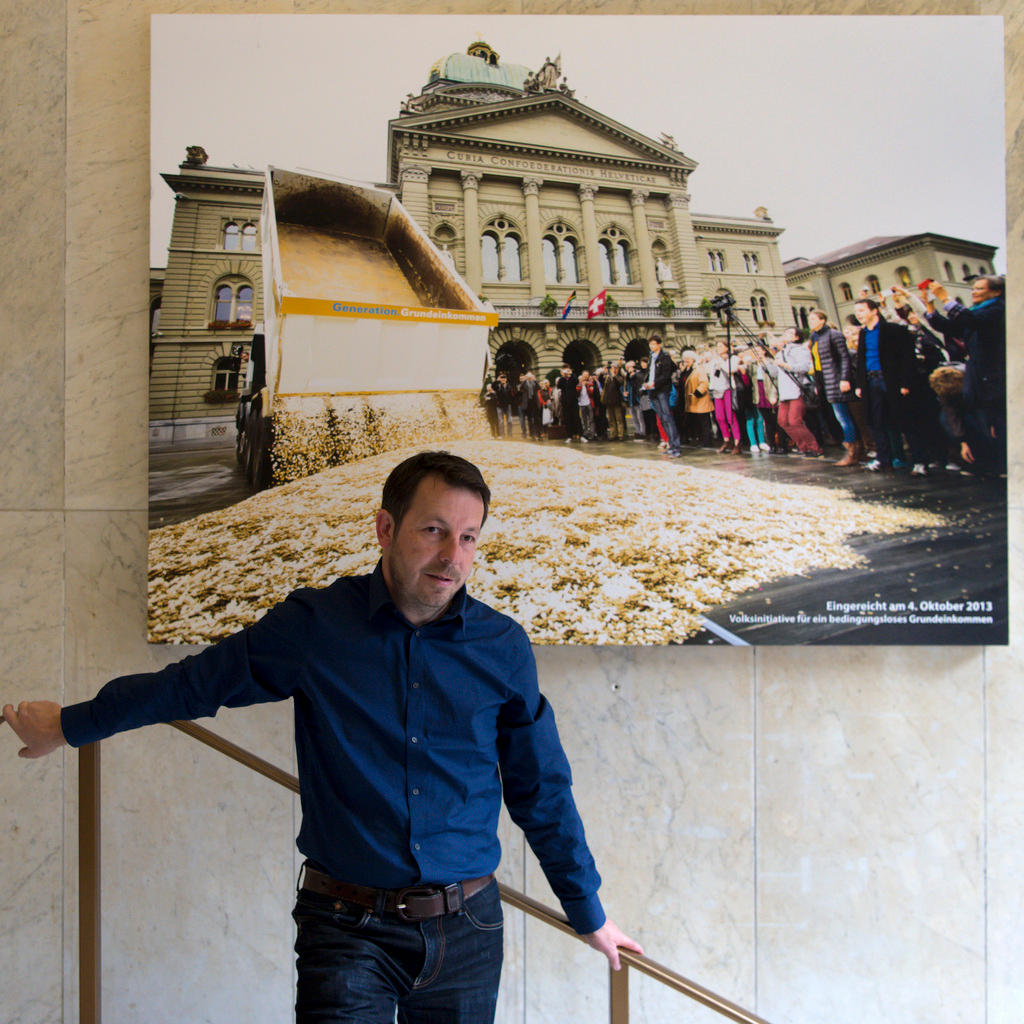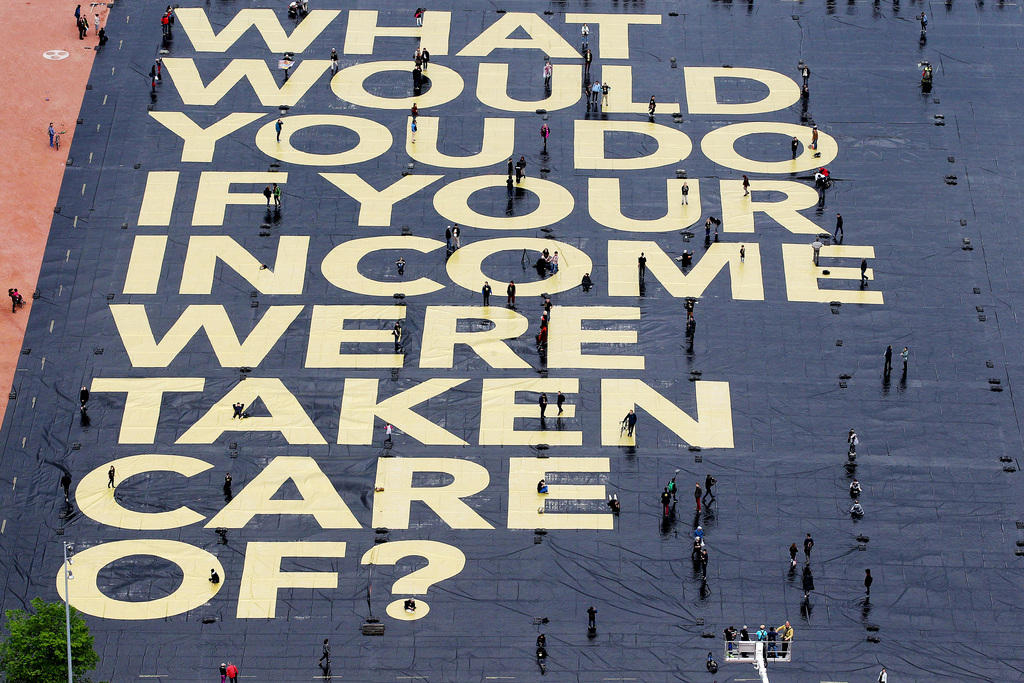Fear and fascination with a basic income

The campaign to introduce an unconditional basic income has won admirers and detractors, spawning numerous news stories along the way. swissinfo.ch visited two campaign nights to test the waters ahead of a nationwide vote on June 5.
It is a warm May evening in Basel. Daniel Häni leaves a panelled conference room and heads to a nearby café in the old city. He has just presented the idea of an unconditional basic income to the local conservative right Swiss People’s Party.
The result was foreseeable. None of the 60 or so participants were favourable to the controversial proposal – a unanimous verdict of the mainly middle-aged registered party members.
“It was a challenge,” says the senior member of the initiative committee. “It was fun but peoples’ minds were made up beforehand. Still it was a nice democratic procedure.”
Häni admits that the power point presentation could have been shorter and, in hindsight, he should have addressed the concerns of an elderly party member. She was worried about losing her cleaning lady who might decide to give up her job if the initiative for an unconditional basic income were accepted by Swiss voters.
Others in the room asked for clarifications and occasionally the tone of the meeting almost turned ugly. Häni says there were moments when he was irritated by the comments and murmuring from one corner of the room.
“Peoples’ minds were made up beforehand. Still it was a nice democratic procedure.”
Daniel Häni
However, there was no harm done and certainly it is not a reason to give up. “Our campaign is getting into full swing,” says Häni optimistically. The results of a recent poll might not exactly be rosy, but he is looking farther ahead into the future.
“The basic income will not be introduced on June 5. But it is only a question of time,” he told his audience.
Community centre
Two days later in a community centre on the outskirts of the Swiss capital, Bern, more than 80 people watch a rather educational film produced by the campaigners. The air in the crowded room is getting stale and the rain pounds the roof of the renovated building, a former barn surrounded by a park.
It is a middle class audience made up of young and old, and nearly as many women as men. It’s fair to assume that many of them are open to the idea of a basic income and hope to be fully convinced at the end of the evening.
“It was interesting, wasn’t it? Even if I didn’t quite understand everything that was said.” Listener reaction
The four panellists have to fight for the only microphone on the podium. It is striking how some of them try to grab the attention of the audience, telling family anecdotes or relating professional and political experience to prove their point.
About 60 minutes into the animated exchange of questions and answers, the debate finally gets to the main issue at stake in the vote: The ethical and monetary value of work. Is only paid work worth a salary? What about voluntary activities?
Open questions
“I have rarely seen such a lively audience,” says Oswald Sigg of the initiative committee. He says he didn’t mind the somewhat confrontational style used by a local politician in charge of social affairs, an opponent of the initiative.
The man, also a trained economist, has said the proponents have left too many questions open. But he can’t help being impressed by the campaign and the fascination the initiative appears to have on the general public.
Sigg for his part keeps his calm. He’s more irritated by newspaper editorialists who he says remind him of the conservative rhetoric of the late 1960s when new ideas about a liberal society reached Switzerland from neighbouring France.
Leaving the event late at night, two middle-aged women open their umbrellas sidestepping the puddles on the ground. “It was interesting, wasn’t it? Even if I didn’t quite understand everything that was said,” says one. “Oh well, the basic income is not for now just yet,” says someone else.
Spectacular
The prospects for June 5 may be anything but promising for the initiative. But the promoters will probably go down in the recent Swiss history of political campaigning for their creative drive. A victory of sorts?
“Democracy is not a number game,” says committee member Häni.
The list of spectacular events staged over the past nearly three years by the initiative group ranges from publicity stunts – eight million coins dumped in front of the Swiss parliament, the free distribution of CHF10 bills at railway stations, a Guinness world record-winning poster – to a golden campaign car, a demonstration of cardboard robots in the streets of Zurich on Labour Day, several books publications, as well as countless articles and reports in domestic and international media.
Not to mention the dominant role in social media, for instance in launching a crowdfunding drive, and regular updates on the campaign.
Some critics have found fault with this strategy, saying traditional grassroots campaigning has been neglected.
Fresh faces
Political scientist and public relations expert Mark Balsiger begs to differ.
“The campaigners have had brilliant ideas which they realised successfully,” Balsiger says. “The group is made up of fresh faces and they managed to win broad public attention over a longer period of time.”
Therefore, it is understandable to limit somewhat the traditional approach of public debates and information events, according to Balsiger.
He adds that the key figures in the campaign came across as clever and “cool” while the initiative has also benefited from goodwill in the media, notably because the proposal stands virtually no chance of winning a majority at the ballot box.

In compliance with the JTI standards
More: SWI swissinfo.ch certified by the Journalism Trust Initiative
















You can find an overview of ongoing debates with our journalists here . Please join us!
If you want to start a conversation about a topic raised in this article or want to report factual errors, email us at english@swissinfo.ch.